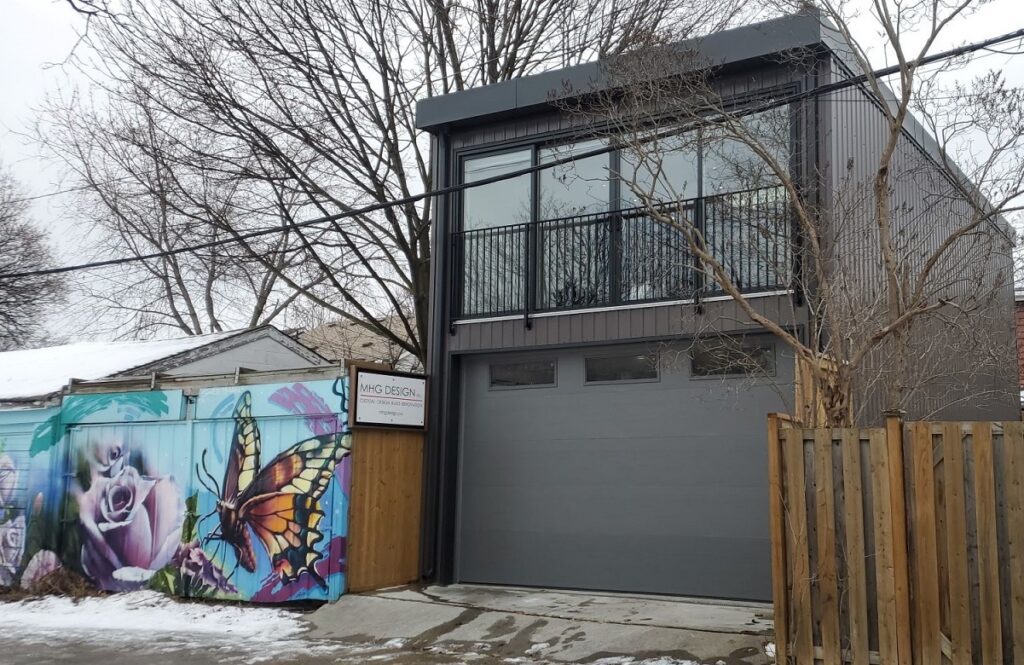With talk of how difficult it is to purchase a home in Toronto in 2017, there will undoubtedly come talk of alternatives.
Moving out of the city is one alternative, no doubt about it. This is a topic we’ve explored before several times.
But I’m hearing a lot about “co-ownership,” and I don’t mean buying a co-op as an alternative to a condominium, but rather the idea of, say, two young couples, pooling their money to buy a duplex.
The advantage is obvious: getting into the market, and owning real estate. But today I want to look at the disadvantages, and what could go wrong…

There was an article in the Toronto Star on the weekend about “co-living,” which suggested that the style of living that’s gaining popularity in expensive cities in Europe and the US is something that we could see develop here in Toronto.
Read the article here: “Co-Living Could Be Answer To GTA Housing Crunch.”
The problem I see with this, of course, is that it likely relies upon the government to spearhead the initiative, and determine what is legal and how any housing “collectives” would be operated, in the same way there’s legislation for building codes, health and safety, etc.
I just don’t see this happening any time soon, as I consider our government, at all three levels, to be inept. But that’s a topic for another day, and if you get me going about Kathleen Wynne cancelling John Tory’s road tolls in a desperate attempt to gain back favour with the public, well, I’ll never stop talking. On that note – make sure you read Marcus Gee’s fantastic column, “Wynne’s Veto of Toronto Road Toll Plan Is An Act of Cowardice.”
See what I mean? Nothing like politics to throw you off topic…
So while innovative housing solutions will go from novelty to necessity as the years go on, and the population continues to grow, I don’t see them coming down from the government level any time soon.
In the meantime, it’s up to individuals to be innovative, and find ways to get into the real estate market when they otherwise wouldn’t be able to afford it.
The ever-popular “house with basement apartment” has risen in price so dramatically over the last few years, that I honestly don’t know if it’s worth it anymore.
Rewind three, four, or five years – and I was selling $600,000 houses with basement apartments that rented for $1,000. That $1,000 could carry over $200,000 worth of mortgage, and suddenly the cost of living in this house was the same as owning a smaller condominium.
But as the years went by, every buyer in the city of Toronto wanted a house with a basement apartment. And while I’ve long-maintained that the same house with a fully-renovated basement that contains a large rec-room, guest bedroom, and 4-piece bathroom is worth way more than the house with a basement apartment (the ‘single family’ buyer will pay more for the ‘single family’ home than the buyer on a budget, looking for basement income), every house with a basement apartment seemed to rise in value at a greater-than-average rate.
So now that those $600,000 houses with $1,000 in the basement are now $900,000 with $1,100 in the basement, where to these buyers go?
That’s where the creativity comes into play.
And through 2016, I heard multiple cases of buyers pooling their resources, and “partnering” to buy properties.
There was an article in the Globe & Mail last year called, “Two Couples Pool Money To Live Under One Roof.”
My mortgage broker, Joe Sammut, was quoted as saying that these deals account for less than 1% of his business, but when you think about it, if even 1 in 100 sales involves multiple buyers, that’s a lot more than I’d have ever thought. And more to the point, I’d expect this trend to grow as prices rise, and as buyers get more creative.
So with this idea gaining momentum, I thought it prudent to do what I do best, and play devil’s advocate, to point out the potential pitfalls.
The way I see it, there are five major potential issues here:
1) Disposition Of Asset
This is clearly the largest “potential issue” you could possibly come across.
What do you do when one person, or one couple, wants to sell?
Use the scenario from the Toronto Star article, where two couples buy a duplex, and each live happily ever after in their 2-bed, 1-bath unit; one below, and one on top.
I think it’s fair to say that the two couples won’t live there forever, so what do they do when time comes to move on?
Your first suggestion might be, “Have one couple buy out the other.”
But if they’re pooling their money to be able to buy the property to begin with, then what makes you think one, two, or ten years down the line, when the property is worth even more, that either couple would have the funds to buy out the other?
When, how, why – all questions to be answered regarding the eventual sale of the property.
The potential for conflict is massive.
What time of year do you sell?
Who do you hire?
Do you spend money to fix it up, or sell it as is?
Do you move out of the property, like many people do, during the week of showings? What if one couple is on board, and the other isn’t?
I suppose all of this is small potatoes to the “when,” however.
The biggest problem with co-ownership of a property, is without question, going to be when to sell it.
2) Growth
If a couple moves into a 2-bed, 1-bath apartment in a duplex, and then has a kid, are they okay there?
What if they have two kids?
What if one changes jobs and starts to work from home?
What if the couple’s parents start coming to visit once per month, and need a place to stay?
Life in 2016, for just about everybody on the planet, will not be the same as life in 2021.
And eventually, one couple, or one partner in the property, is going to want more space.
That’s when the couple downstairs is going to look above, or vice versa.
As I said in point #1, buying out the other partner might not be financially viable. But if it is, then how do you go about it?
Many businesses with two partners have a “shotgun clause,” where one partner pulls the trigger and names the price, and the other party can either pay that price, or be bought out at that price.
The first time I ever heard of this was back when I was in high school. The Toronto Raptors co-owner, Allan Slaight, enacted his shotgun clause with co-owner, John Bitove. $50,000,000 for, I believe it was, a 39.5% stake in the team. Nine years later, and hindsight, I wonder how Mr. Bitove feels, as the Raptors have to be worth $600-$700 Million, don’t they?
In the end, it’s fair to say that most people eventually outgrown their home, save for those at the completely opposite end of the spectrum who elect to downsize. But we’re talking about first-time buyers, and sooner or later, everybody needs more space.
If you own a condo, and you sell to buy a house, that’s simple enough.
But when you’re joined at the hip with a partner or co-owner, moving up, and on, is no longer that simple.
3) Maintenance
The points that follow will demonstrate that some expenditures are necessary, and some are discretionary.
But for items that need to be done, is everything split 50/50?
Who pays? Who reimburses who?
What if one party is “having cash flow problems” after the other party pays $4,000 to replace the busted A/C unit?
Who is responsible to monitor the systems in the home?
Who takes out the damn garbage?
Who mows the lawn?
If one person enjoys gardening, is that an individual hobby, or is that value-add on the home, and thus the gardening-party would expect reimbursement?
Remember back in university, living in a house with five people, how the Bell Telephone bill was in one person’s name? And each month, that person would ask the other occupants to go through the bill, highlight their calls, and determine what they owe. The person with the bill in his or her name never got full reimbursement.
Imagine doing this as an adult, with every expensive on the house? The property taxes, hydro, gas, water, insurance, and then the ongoing maintenance?
4) Renovations
Let me give you a scenario.
Owner-A lives upstairs, and wants to renovate his kitchen.
Owner-B lives downstairs, and already has a renovated kitchen. For whatever reason, when they bought this duplex, one unit had a renovated kitchen, and one unit didn’t.
So Owner-A goes to Owner-B and says, “I’m going to spend $20,000 on the kitchen.”
Does Owner-B then simply write a cheque for $10,000?
What if Owner-B says, “Tough luck,” then what?
Or change that scenario above – what if both owners have outdated kitchens, and one wants to renovate, and the other doesn’t.
Do they go ahead? And if so, who pays for what?
These aren’t two condominium units within one building. Each partner owns half of the entire property. Who lives in which unit has nothing does not change the ownership of the property as a whole.
I could see this issue arising a lot as the years go by.
5) Style
This follows from point #4.
When do you agree to “update” the property? Often renovations come not from need, but rather desire.
If the furnace breaks, then both parties would agree to fix it.
But what if the property just becomes stale?
Some home-owners will re-do their kitchen every five years. Some never do.
How do you decide when to spend money on aesthetics?
–
After reading these five points, you’ll undoubtedly conclude that co-owners really need legal advice before taking on the endeavor.
And not just legal advice – I’m talking an ownership agreement, that lays everything out.
What if one owner wants to take out equity on the property? Where is that written in the agreement? That doesn’t fall into the five points above! Imagine if one owner found out that the other owner had taken out a $200,000 loan against the home? Can he or she do that, or does the other party have to sign?
Many of you will comment that the points above, and any subsequent points or discussion, simply highlight the problems that any partners, in any business, will ultimately face.
And you’d be right.
I’ve never been a big fan of “partners” in investments.
And if and when you do take on partners, working with friends and family simply gives you a 50/50 shot of losing a friend, or becoming estranged from a family member.
Now I said at the onset that co-ownership an idea that is gaining momentum, and I would simply play devil’s advocate.
I think I’ve done that.
And if I had to take it a step further and give a “yes or no” on the matter, I’d honestly have to straddle the middle ground, and say, “It really depends on the people, and the situation.”
I would never co-own.
And I can’t think of any of my clients who I would advise to do so.
But there’s something to be said for getting into a hot real estate market, when you wouldn’t otherwise be able to.
Gaining a place to live, and riding the appreciation wave, might make sense to a lot of folks out there…































Libertarian
at 11:19 am
David, you wrote last week that the elites will own all the homes in 50 years. Other commenters said that it’ll take only 20 years. But if co-ownership is already here, then it’s already happened.
I’m not a real estate bear. I am not even pro renting instead of home ownership; I am homeowner myself. But there comes a point in a person’s life when they simply have to accept the fact that they can’t afford home ownership and all the costs that go with it, even if their equity in the home increases. Getting into bidding wars and paying these high prices is not smart money management when you don’t have any money to begin with.
If people want to buy a home as an investment, but can’t afford it without co-ownership, then they should simply invest elsewhere. There’s more to life than owning half a house.
Geoff
at 2:59 pm
Good point. I’m not pro-renting or pro-homeownership, I’m pro-math. If it makes more sense to own, own. If it makes more sense to rent, rent. I bought our house in 2007, and so have seen a ridiculous increase on paper of the value my home. But I fully expect my son to rent his home if he lives in Toronto. If he works as a coder in Romania but is paid North American wages, then maybe ownership makes more sense. #mathPeoplemath
mike
at 11:42 am
Set it up in a corporation, name an independent director to the board (third-party lawyer perhaps), expenses not paid are considered loans from the company payable on divestment. Put in the shot-gun clause for your exit in case you can’t come to an agreement on when to sell with the knowledge that you’re probably not going to be able to buy the rest of the house but sell the whole building and distribute any profits.
Unfortunately most people won’t heed David’s advice on this and skip the lawyer part because it’s “too expensive” but such is the fate of too many real estate transactions.
Julia
at 12:18 pm
I think that the co-ownership idea will continue to gain in popularity simply becasue owning half a duplex is less expensive than owing a semi. This may be a ridiculous qustion, but can the seller of the duplex elect to sell each unit individually with the understanding that the basement/storage/laundry area and the back yard were common areas? This would not solve ALL the issues that David has outline, and would have to be accompanied by a lenghty lawyer drafted agreement but it would at least help to eliminate the issue of what happens when one party wants to sell….
Ed
at 12:34 pm
I can see the concept of co-ownership growing but in a different way and that would be multiple generations living under the same roof. Possibly in separate units or not. It is already happening on a large scale. 35 year old child gets divorced, moves back in with the parents.
As far as I know the multi generation household is the norm in Europe especially in many major centres where housing is ridiculously expensive. As we can see there is a huge demand for for housing and prices are sky rocketing. It can’t go on forever. Can it?
Joel
at 12:35 pm
I really don’t like this idea as I can’t see any way in which this will work out for most people. I saw an article ‘perhaps on here’ several months ago about developers taking down single family homes and getting them zoned as separate units even though they are in the same building.
This would help solve many of the problems if the government (City planners) would allow a certain percent of homes to be subdivided. We already have single family home that are illegally run as 3 unit rental, so I can’t see how this would be a problem of density.
Condodweller
at 2:33 pm
The biggest problem I see here, as long as we are focusing on problems, is when one owner can’t pay his/her share of the mortgage. How do you evict a title holder whithout selling? At the very least I would want a shotgun agreement to force the other party to sell prior foreclosure to ensure I don’t lose my equity.
I would never want to do this myself but necessity is the mother of all inventions therefore, if I was looking for a place to live and didn’t want to rent but couldn’t afford a house, it may become a viable option. I suspect people will do it the same way as they handle their finances. They won’t plan ahead, will enter the relationship and deal with the problems as they arise. Simple. All problems sort themselves out eventually. It won’t be the most favourable to both parties, but they will be sorted out. It will be a new income stream for lawyers.
Geoff
at 2:56 pm
All problems sort themselves out eventually?
Like, you mean as death as final eventuality solution? Because in my experience there are plenty of problems that never sort themselves out.
Condodweller
at 10:36 am
Hopefully things don’t get so bad that these cohabitors resort to killing each other. You are taking what I said too literally. What I meant to say was that major problems get resolved with the passing of time and that they are not insurmountable. We tend to worry and stress over problems which get resolved in the end. My main point was that most people don’t plan ahead and therefore don’t worry about potential problems such as brought up in this post but will simply deal with them as they arise.
It will be interesting to see how banks will handle these though. If a single household can’t qualify for the mortgage the cohabitors will need to approach the bank together and officially pool their resources to prove to the bank that they can afford to pay back the mortgage. If the banks do play ball and are willing to provide a mortgage I suspect many of the potential problems will be alleviated by conditions the bank will put in place in order to qualify such as life/disability insurance on each other etc.
steve
at 5:16 pm
Excellent post … I think that about covers everything !
Bullish Vancouverite
at 12:52 pm
David, you really did hit the nail on the head with this one! Just sold an investment property I owned jointly with my sister and her husband and we ran into every single problem you listed!! lol Our joint venture didn’t even last 12 months largely in part because of points #3,4, and 5. One didn’t see value in replacing the 1960’s cabinets because of it being a rental, one didn’t want to make structural even though we had gutted the place, one didn’t see value in spending the couple hundred dollars on a co-ownership agreement so we were all protected. It was hell…and it ultimately ruined my relationship with my sister. So my suggestion to anyone who is thinking joint ownership, make sure your partners have the same sort of property experience as you(ie. renovating, flipping, etc).
Kyle
at 1:38 pm
13 years ago my brother and i co-owned a home and it was a very successful arrangement. What helped is that we had a shared vision from the beginning, we had complementary expertise and we both contributed an equal amount of capital and sweat.
Co-ownership combines two very tricky situations. Being house mates (assuming both parties are also living there) which on its own is tricky AND being business partners on an investment (presumably you’ve partnered up because there is an economic benefit in doing so). It has to be a good fit on both fronts. So you’ve got to ask yourself, can i live with this person? And do i want to be a business partner with this person (e.g. what are they bringing into the business relationship and what am i bringing into the business relationship)?
crazyegg
at 3:56 pm
Hi All,
Basement apartments should be a priority for buyers in the GTA. This was my number one driver when I was house hunting. It was even more important than location, believe it or not.
In order to get into this market, buyers will need to make serious concessions. One of those I think is to reduce expectations on the soft elements of the home (dated kitchen, bathroom, hardwood). All of these can be changed relatively easily. Focus instead on potential.
In other words, buy a crappier house that has an existing accessory apartment (of the potential to build one).
This apartment will serve both short and long term needs of your life stage. SHORT TERM: Income generation via rental. LONG TERM: Personal office space or space for the kids when they get older).
Regards,
ed…
Frances
at 10:12 pm
You write as if the co-owners are living separately in the house they co-own but the article I read showed that the co-owners were sharing the whole house which is quite a different situation. I think that the first situation could work quite well, given a certain amount of goodwill on everyone’s part. I also wondered if the co-ownership could be set up as a condominium in that case. The second situation is asking for trouble.